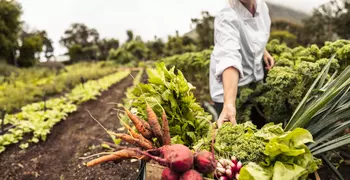
 One of the most complicated aspects of climate change is that it can feel like a huge, abstract problem. The science is sometimes complex, and it's hard to fully understand massive, global problems - especially if we don't see the direct effects in our life (such as sweltering temperatures or asthma from air pollution).
One of the most complicated aspects of climate change is that it can feel like a huge, abstract problem. The science is sometimes complex, and it's hard to fully understand massive, global problems - especially if we don't see the direct effects in our life (such as sweltering temperatures or asthma from air pollution).
For many of us, it can feel so overwhelming to try to help that we just give up. Where can we start when trying to improve planetary health? And can we, as individuals, even make a difference?
The Lowdown on Drawdown
Project Drawdown is an organization that reviews and distills climate research into practical solutions. The word "drawdown" refers to the point when greenhouse gas emissions stop climbing and start decreasing. Reaching drawdown requires a global effort, and Project Drawdown offers 80 evidence-based plans for governments, communities, and individuals to follow on the path to saving the planet and the humans that inhabit it.
Below are ten solutions suggested by Project Drawdown, with tips for how you can take action on each. For even more ideas, join Drawdown's Ecochallenge and find measurable actions you can take to reduce global warming. Still want to learn more? Register for a three-part, online presentation that includes Drawdown experts this September, hosted by the Earl E. Bakken Center for Spirituality & Healing at the University of Minnesota.
Our tip: Pick one or two solutions that look interesting and manageable to you. Pay attention to when you're feeling overwhelmed. That's a good sign that you might want to relax, take a deep breath, and focus on what feels most meaningful in the moment.

Reduced food waste
Although there are millions of people on this planet who are hungry every day, food waste remains a big problem in both agricultural systems and home kitchens. Whether it's caused by poor storage in low-income countries or a disdain for unattractive foods in wealthier countries (crooked carrots, anyone?), wasted food releases planet-warming carbon dioxide into the air as it rots. In addition, producing that food in the first place wastes energy and resources. Drawdown summarizes the problem as "People who need food are not getting it, and food that is not getting consumed is heating up the planet." In short, reducing food waste is an urgent priority for planetary health.
Think before you toss! Can you freeze it for later? Can you make a new dish? (for example, nearly black bananas make the best banana bread, and mushy peaches are great in smoothies). Search the web for ideas and recipes.
To better understand how food waste occurs in your own kitchen, write down every bit of food that gets thrown in the trash throughout the week, including the reason why. Did it go bad? Did you buy too much? Were you unsure of how to save it safely? Use this personal research to determine how best to reduce your waste. Perhaps you simply need to buy less, or learn better strategies for freezing or re-using leftovers.
Composting is a great way to use those unusable food scraps (like peels or rinds) while nurturing your garden as well. The composting process converts food into stable soil carbon, rather than methane (which is what happens to food at a landfill).
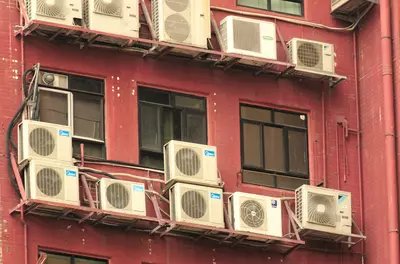
Refrigeration
When it’s hot out, we want to cool off - and paradoxically, some of our favorite ways of keeping cool contribute to global warming. In particular, our refrigerators and air conditioners release chemicals that warm the atmosphere. Over the next decade, these chemicals will be phased out and replaced with more earth-friendly substitutions, which have the potential to make the biggest impact on climate change. But that's a long process - and until then, hundreds of millions of new appliances will be turned on, and the ones already in people's homes will continue to leak emissions, especially when they are thrown away.
If you have an old, unused freezer in your basement, or a broken window air conditioner in the garage, find a Responsible Appliance Disposal (RAD) program in your area to help you dispose of it responsibly. If you can't find one, the US Environmental Protection Agency (EPA) recommends checking with your state energy office or local electric utility.
You can also support supermarkets that are making an effort to reduce their refrigerant emissions, and contact ones who aren't yet on board to let them know that as a consumer, you care about their efforts.
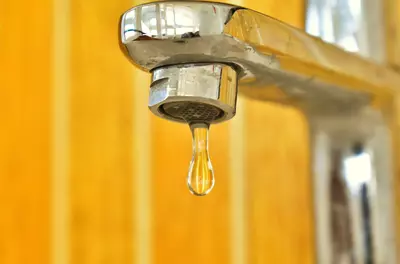
Water saving
So many of our daily activities at home involve water - bathing, cleaning, washing dishes, laundry, using the toilet, cooking, watering the lawn - that we rarely stop to contemplate how much we are actually using. The average American household uses 98 gallons of water each day, more than other families across the globe. Getting that water to each household, and managing its waste when we are done using it, takes a considerable amount of energy. What's more, we tend to like our water hot, so additional energy is consumed by the heating process.
If you have the resources, a one-time solution is to switch out older technology - such as a dishwasher or laundry machine - for a newer, energy efficient version. Even low-flow showerheads can make a difference and are reasonably easy to install.
Changing your habits, however, is free and can reduce water use by 7-8 percent. Try setting a timer for five minutes to shorten your shower in the morning, collecting rainwater to feed your garden, and waiting to do laundry until you have a full load. Regularly check your water supply taps, such as outdoor spigots and indoor faucets, to make sure there aren't any leaks (which can account for 10 percent of your total water use!)
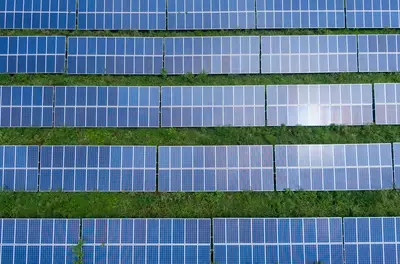
Solar power
The science of solar energy is nothing short of magic - and with a sun that reliably appears in the sky every day and generously offers its rays for free, capitalizing on the solar power is a good choice for reducing carbon emissions. Personal rooftop solar panels are becoming less expensive and more widely used every year. On a bigger scale, solar farms comprise hundreds or more of these panels working together to provide clean power to entire communities.
Of course, if installing a rooftop solar panel on your home is within your means, go for it! You can also make an impact by educating yourself on the benefits of solar energy, sharing your knowledge with friends (who may be influenced to install their own roof panels), and advocating for renewable energy via calls to lawmakers and your power company.
You can also study the RE100 initiative's list of 100 companies that are fully committed to renewable electricity. Use your power as a consumer to support one of these companies by buying their product or simply recommending them to friends.

Plant-rich diet
We don't always take the time to appreciate how the food on our plate got there, and at what cost. Meat - especially red meat - is particularly tough on the planet. Forests are destroyed to make room for grazing, fertilizers produce nitrous oxide, and cows emit the greenhouse gas methane as they graze. Most climate change experts agree that reducing meat consumption is one of the most important tasks we have as a global community. In addition to being more eco-friendly, plant-rich diets may also reduce risk of some chronic diseases and add years to your life.
If you eat meat regularly, designate one or two nights a week to be meat-free. Be curious and open-minded: if you've never had chickpeas before, look up ways to incorporate them into a hearty stew. Challenge yourself to create a plate with 3-4 colors on it. Ask friends for their favorite veggie recipes, and share yours with them. As you eat, be mindful of the flavors, textures, and colors of your meal, as well as how you feel afterward.
Shifting to a plant-forward diet doesn't have to be complicated. You can still make your favorite meals by simply substituting plant alternatives in for meat (such as three-bean chili, or a grilled portabella mushroom burger).
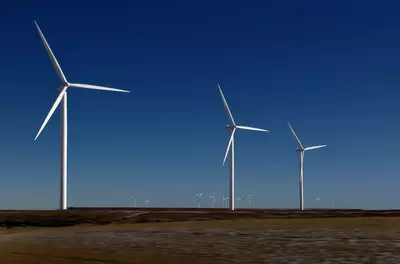
Wind energy
Though we may not yet be used to seeing them on the side of a highway or along the coast, wind turbines are super-efficiency machines: they use very little land, are easy to build, and can provide low-cost electricity with zero pollution. As of today, these powerful turbines may feel foreign to societies that lean heavily on fossil-fuel industries, but as costs drop and new designs address concerns (such as noise or danger to migrating birds), Drawdown researchers predict that wind energy will become one of the most important investments we can make in the effort to reduce global warming.
Spend 10-15 minutes reading about the benefits of wind energy, and use your knowledge to bring it up with friends who haven't heard about it before. You can also call elected officials to voice your support for wind energy in lieu of fossil fuels.
Another thing you can do is check to see if your electrical company offers the option to get your electricity from windmills. This encourages those companies to increase this capacity. Write or call your electrical company and encourage them to source more from wind power.

Reduce, Reuse, Recycle
You have probably heard of the "3Rs" - reduce, reuse, recycle - but how well do you integrate them into your life? These instructions are intended to be performed in that order: first, reduce your consumption of waste-producing products, such as plastic. Then, reuse what you can in order to avoid purchasing more. Finally, when you can no longer use it, recycle the product so it can re-enter the stream of consumer goods with a new life and a significantly lower carbon footprint.
 Assess the waste your household produces to see if there are hidden ways to tap the 3Rs in your daily life. Reducing your waste production might mean bringing a canvas bag to the grocery store so you can avoid using plastic bags, or buying your cereal from the bulk bins and storing it in a reusable container. If you order food delivery, tell the restaurant you don't need plastic utensils or napkins.
Assess the waste your household produces to see if there are hidden ways to tap the 3Rs in your daily life. Reducing your waste production might mean bringing a canvas bag to the grocery store so you can avoid using plastic bags, or buying your cereal from the bulk bins and storing it in a reusable container. If you order food delivery, tell the restaurant you don't need plastic utensils or napkins.
When you do bring items like plastics into your home, find creative ways to reuse them and extend their life - for example, carryout containers can be washed and used to store leftovers in your refrigerator, and an empty laundry detergent container can be fashioned into a DIY watering can.
Finally, recycle what you can no longer use. Make sure to sort your materials according to your city's recycling policies, and avoid adding non-recyclable waste (such as styrofoam), which can contaminate the recycling process.

Educating girls
Women who are educated tend to have fewer children than uneducated women; what's more, those children are healthier. A smaller, healthier global population would result in lower emissions, re-directing our course from calamity to planetary health. But educating women also empowers family leaders to take part in developing solutions to environmental change and builds their resilience to manage families and communities when natural disasters do occur. Making schools affordable, safe, and accessible to girls across the globe is one of the most unexpected but significant steps we can take to heal our planet.
To better understand the connection between girls' education and global warming, watch this TED Talk by Project Drawdown expert Katharine Wilkinson. If you want to contribute directly, you may also raise money for Malala Fund, which supports the work of education champions in developing countries.

Tropical forests
Forests near the equator have been so regularly depleted for farmland or human settlement that their footprint has decreased from 12 percent of the earth's land to just 5 percent. Deforestation is harmful for the reasons you might first guess - such as the displacement of animals and plant loss - but it also releases carbon dioxide into the atmosphere, causing 16-19 percent of the planet's human-caused greenhouse gas emissions. Restoring tropical forests, either by allowing them to grow back on their own, or supporting their growth through planting, could have a significant impact on reducing global warming.
Set aside some time to learn about how your food choices contribute to deforestation. Palm oil, coffee, cocoa, meat, dairy, and eggs all lead back in some way to the destruction of tropical forests. Reflect upon the role of these foods in your life, including whether you can give them up completely or whether you could make more environmentally healthy choices.
While you may know when you are drinking coffee or eating chocolate, you may not even realize how many consumer products contain palm oil. Educating yourself on how you use these products can make you a more responsible shopper. Buying coffee and chocolate that is Rainforest Alliance Certified, or palm oil products that are Certified Roundtable to Sustainable Palm Oil (RSPO), allows you to keep using the products you love in a responsible way.

Family planning
One reason the planet is changing so drastically is that there are simply so many people on board. Similarly, unintended pregnancies can harm the health and welfare of women and children. Providing women with education and resources to make decisions about family planning can mitigate population growth while building resilience, empowering those women to help their communities flourish, even as existing global warming brings change.
Dig into the United Nations Population Fund (UNFPA)'s work to better understand how family planning can empower women across the globe. The Friends of UNFPA nonprofit has excellent information on how to support women through donations, advocacy, and personal fundraisers.
